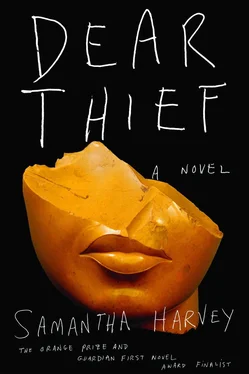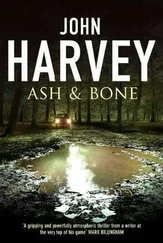I saw her, and she gave me a ticket to a matinee that afternoon of a Pinter play that she couldn’t go to because she had been called into work; she was supposed to be going with her daughter and she insisted that I went so that her daughter wouldn’t be on her own. The play was Monologue , one man speaking for half an hour to the empty chair next to him where he imagined his friend of old to be. Ruth’s daughter was rapturous about it afterwards, about the subtext and everything that wasn’t said. For myself, for half of the play I’d fought the urge to go and sit in the empty chair. For the other half I’d fought the urge to leave and find an address to send this letter to. No good writing to Butterfly if Butterfly can never read what’s written, no good. Not a form of expression at all, but a form of silencing. No good this man talking to a chair, better that he talked to his own navel than to a seat without a sitter.
I went to the map shop on Long Acre and bought a map of Lithuania, which I took home and studied. How else am I to start finding you? If I went to the Lithuanian Embassy and asked to see a phone book I know you wouldn’t be in it. If I asked the handful of people I know who knew you, they’ll have less idea about you than I have. It feels like a form of code-breaking to squint at this map and try to fathom you from the printed pixels, to try to deduce your whereabouts from things you said, did, bought, thought, things you hoped for, things you hated. There are areas I know you won’t be, the towns and cities. I think you must be in the forest. Probably because of what you wrote on Teddy’s postcard about living in the desert I’m drawn towards Nida and the west, though I know there are far too many tourists for you to be near the dunes themselves. The north-western forests maybe, close to the Latvian border where nobody will think to look for you.
By the time Nicolas came round in the evening I was cooking; I smiled when I saw it was him at the door. I had been singing to the music coming in through the window. I had drunk a little. We ate a split portion of pasta and mussels and played a hand of Whist. But as we were lying in bed about to sleep I thought of the map I’d folded and put on the bookshelf, and then of the lost cow shin somewhere in the Thames or on the shore, and of the lock of black hair in a box between two sheets of newspaper. Every gentle notion I’d trained myself to have deserted me for no reason, as if I were two people in one form. I do good, I sponge down aching backs, I inject insulin painlessly, I massage knotted feet. Most things have become alright by me, most arrangements, I don’t distinguish between the conventional and unconventional or the good and bad, and I don’t have any interest in judging. But sometimes still, even on a day that’s going well, this lack of tolerance, what Nicolas this evening called the dirty fire: you burn and leave soot, he said when I asked him suddenly to go home.
But it was his fault, I told him. He came round on a whim, he ate half my dinner, I was still hungry as a matter of fact, I had nine mussels. Nine! I was starving. He had his elbow on my hair while we made love and because he was so deeply absorbed in his own pleasure I couldn’t attract his attention to tell him it was pulling. My scalp was sore, in case he was interested, and I was tired of winning at Whist and didn’t understand why he couldn’t make an effort. Just a small effort to win! Would it hurt?
So he got out of bed and plucked his clothes off the floor. ‘You burn and leave soot,’ he said on his way out. ‘My mother warned me about you, she warned me about beautiful women, their aftermath.’
‘Your mother was a despot,’ I replied, and I shoved the door closed behind him with my foot and sat down to write this, and have been writing it since with the map spread on the floor. Now that dawn is coming the feeling of intolerance has gone completely, and all I have, looking at the map, is a recollection of you talking about the disappearance of your country’s forests, hacked down by the Russians and replaced with chemical plants and fertiliser works. Whatever upset me before now seems to have transferred onto these lost ash and oak groves and become more a sense of regret. Nicolas’ mother was not a despot, she was soft-shouldered and charitable. When there are so many true things that can be said in life, I don’t know why I say the things that aren’t.
Does this come hard to you, when I say Nicolas was here? Or does it make you laugh?
There is a particular thing he used to always do with me; I don’t know if he ever did it with you. He would be bouncing a football from one knee to the other, or hurling a tennis ball at the back wall of the house and catching it on the rebound, or cooking, or reading Private Eye , and as I passed him he would tease, ‘It doesn’t matter how much you know, you will never know what I’m thinking now.’ It pleased him, he would stop what he was doing — put one hand on my stomach, one on my lower back, and kiss my neck in delight at this philosophical ace he found in his hand; ah yes, we are each of us fortified palaces! There is a room at the centre that nobody will ever reach. It made the corner of his mouth twitch. ‘Unless I tell you what I’m thinking, you can never know it. Even if you know everything else in the world,’ he would say.
When I think of him being here, or wait for him to arrive, I think of him as if he will still be like this — with his boylike smile and his curved brow and his pleasure at this little game that was almost sexual, that said I could never drill down deeply enough to know what he was really made of, but which invited me to try. But it is nothing like this any more, as I have perhaps said. There is no longer this simultaneous invitation and denial; instead he comes round and we talk about Teddy and he sits on the sofa with his hands clasped and smiles as if all I see is all I get. At night, he used to wake me up to tell me something of no consequence — sometimes a joke, sometimes an anecdote, bubbles that rose to the surface of his mind when it was dark and quiet; now he sleeps as if he is catching up with all those accumulated years of wakeful moments, sleeping off the jokes, the little tales, while I get stuck in bad dreams.
(I say bad dreams, and I mean it literally, as in a bad book or a bad film — dreams that show no imagination whatsoever. I am about to sit an exam without having revised, I have to catch a flight and I am walking with my suitcase along an empty road, in search of the airport. I wake up and remember the dreams with grubby embarrassment; they call up a flash of otherwise defunct religious shame. I see the Lord shift and roll his eyes. Why, when he has given his people brains of extraordinary power and infinite creativity, must they keep dreaming about exams and being late for flights? And I see him finally forsake me, not because I have wronged him but because I have bored him.)
But you know, it is strange, since beginning this letter on Boxing Day I have started having dreams on your behalf, or at least I don’t know if they are my dreams or yours — I dream them, but I am never in them. You’re in them, and everything is felt through you. Like this one with the rat, which I’ve had the last three times Nicolas has stayed. It is a dream with certain small variations, but each is essentially the same. You are in a room with a rat, which is running towards you. A boisterous dog appears and it picks the rat up in its mouth and brings it to the single bed where you sit pressed against the wall, pleading with the dog to go away, which of course it doesn’t. When it jumps on you, and lays the rat on your chest, you wake up.
Variations: a friend or parent is in the room and has let the rat loose on purpose to frighten you. Or you take the bedside table and smash the last ounce of oxygen out of the rat’s lungs until its flesh is pressed between the floorboards and its blood is all over the walls. Liquid always seems to increase when spilt; it didn’t seem like much blood when inside the rat, but now it looks enough to have come out of a goat.
Читать дальше












